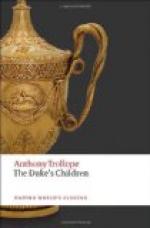The wonder is that there should ever be in a reforming party enough of consentaneous action to carry any reform. The reforming or Liberal party in British politics had thus stumbled,—and stumbled till it fell. And now there had been a great Conservative reaction! Many of the most Liberal constituencies in the country had been untrue to their old political convictions. And, as the result, Lord Drummond was Prime Minister in the House of Lords,— with Sir Timothy Beeswax acting as first man in the House of Commons.
It cannot be denied that Sir Timothy had his good points as a politician. He was industrious, patient, clear-sighted, intelligent, courageous, and determined. Long before he had had a seat in the House, when he was simply making his way up to the probability of a seat by making a reputation as an advocate, he had resolved that he would be more than an Attorney-General, more than a judge,—more, as he thought it, than a Chief Justice; but at any rate something different. This plan he had all but gained,—and it must be acknowledged that he had been moved by a grand and manly ambition. But there were drawbacks to the utility and beauty of Sir Timothy’s character as a statesman. He had no idea as to the necessity or non-necessity of any measure whatever in reference to the well-being of the country. It may, indeed, be said that all such ideas were to him absurd, and the fact that they should be held by his friends and supporters was an inconvenience. He was not in accord with those who declare that a Parliament is a collection of windbags which puff, and blow, and crack to the annoyance of honest men. But to him Parliament was a debating place, by having a majority in which, and by no other means, he,—or another,—might become the great man of the day. By no other than parliamentary means could such a one as he come to be the chief man. And this use of Parliament, either on his own behalf or on behalf of others, had been for so many years present to his mind, that there seemed to be nothing absurd in an institution supported for such a purpose. Parliament was a club so eligible in its nature that all Englishmen wished to belong to it. They who succeeded were acknowledged to be the cream of the land. They who dominated in it were the cream of the cream. Those two who were elected to be the chiefs of the two parties had more of cream in their composition than any others. But he who could be the chief of the strongest party, and who therefore, in accordance with the prevailing arrangements of the country, should have the power of making dukes, and bestowing garters and appointing bishops, he who by attaining the first seat should achieve the right of snubbing all before him, whether friends or foes, he, according to the feelings of Sir Timothy, would have gained an Elysium of creaminess not to be found in any other position on the earth’s surface. No man was more warmly attached to parliamentary government than Sir Timothy Beeswax; but I do not think that he ever cared much for legislation.




